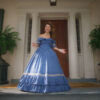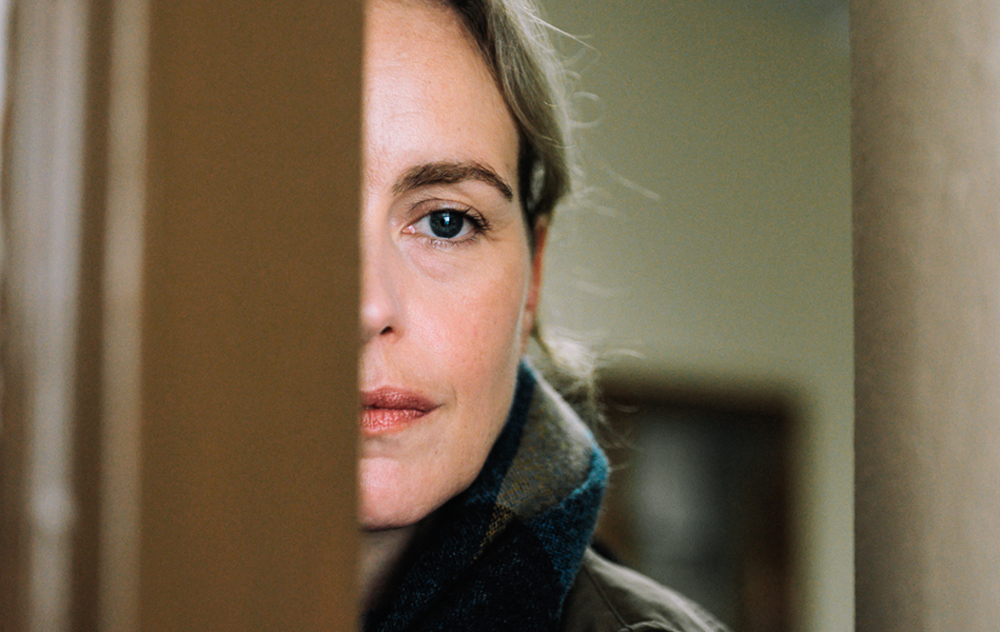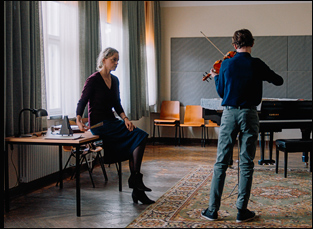In the opening moments of “The Audition,” Anna (Nina Hoss) hears something others don’t when evaluating potential students for the music academy where she’s an instructor, mightily intrigued by Alexander (Ilja Monti), a violinist whose performance of the prelude to Bach’s Etude in C Major seems well beyond the skill of a teenager. His posture is off — his shoulder often drops too low while he plays — but Anna trusts her ears far more than her eyes and after he’s dismissed by the others in the room with a curt “thanks,” she thinks with a six-month trial he could be as good as any student at the school, if not better.
You don’t need to be a music expert to understand why Anna wants to accept the student when once glance at Hoss, the formidable star of Christian Petzold’s “Phoenix and “Barbara,” can express so much, at once hiding from colleagues her sense of an octave that only she and Alexander seem capable of knowing and taking what pleasure she can in that while the rest of her world seems to be falling apart. Just as it takes someone with Anna’s ear to know the difference between Alexander and every other student who is perfectly capable of hitting the right notes, but not necessarily feeling them, Hoss and director Ina Weisse vivisect the music instructor’s life in such a way that even as she seemingly has an ideal life with her husband Philippe (Simon Abkarian) and 12-year-old son Jonas (Serafin Mishiev), you see that she can’t keep going in the same direction she has after seguing from professionally playing to teaching, missing something from her life as ineffable and abstract as the sound that she seeks from her new prized pupil that’s tangible only to her.
Hints of Anna’s shaken confidence emerge in her training Alexander, gradually to the detriment of her relationship with Jonas, who’d rather play hockey than the violin despite prodigious talent, yet the same can’t be said about Weisse and Hoss’ peerless profile of a woman who feels as if she’s been left behind, maintaining the calm composition and passion required by her craft, but only able to live vicariously through others when realizing she can’t perform herself at the level that she’d like. One suspects it was the pursuit of perfection that led to Weisse to take so long to make “The Audition” – that, and a busy career as an actress in her native Germany – after first making a splash as a director a decade ago with “The Architect,” another collaboration with writer Daphne Charizani about the personal life of an artist not quite measuring up to their professional standards, and it was well worth the wait to work with Hoss, a true force of nature whose riveting turns in both “The Audition” and Katrin Gebbe’s “Pelican Blood” were the talk of the Toronto Film Festival.
That made it all the more such a privilege to get to chat with Weisse and Hoss about how they worked together to get the nuances of such a fine drama just right, understanding all that goes into being a world-class musician after reaching similar heights in their own medium, and working with younger actors.
Ina Weisse: It was a long process. Layer after layer, we just started with a woman who’s torn, trying to find her place in life. It was very clear she was a musician and a violin teacher and then step by step, we built out the family and the conservatory. Some scenes I knew years ago, so it’s not only one moment that’s a story. It comes to concentrate.
Nina Hoss: I was immediately intrigued by [this character] because I really like if I don’t understand someone immediately, so I thought, “What is this with the woman?” I could relate to being very disciplined as a musician, and that’s what you ask from your pupils as well. But on the other hand, she keeps on talking about [how] you have to imagine the sound before you produce it — it’s all up to who you are as a person and what you want to express in your music and to be able to do that, you’ve just got to be able to work like crazy to have the technical part down. That’s intertwined with a personality, and [as Ina said] you put layer after layer out and discover who she is, because she doesn’t know in the moment of time. It also shifts from light moments with the husband, and the marriage is a good one – they love each other, but she needs something else in this moment of time and she just takes it, which is also very confident and surprising.
I could also relate to that [where] you’re in your forties and you say, “Is this it now? Is this my path?” Or friends that I have that have a huge dream and then in the middle of your lifetime, you go, “Okay, maybe I’m actually happy with not having achieved it, but maybe you’re not. Maybe you hold yourself back because you put too much pressure on everything you do. All of these things I found in Anna and [they were] so intriguing.
Ina Weisse: Each musician and each person perhaps has a dream and one percent of these musicians make it to the stage and play. And 99% have to fight. The other 1% has to fight too, of course, but there are lots of musicians, they’re very, very good, but…
Nina Hoss: Yeah, it’s the sound. It’s this little extra that catapults you into a higher sphere.
Ina Weisse: And as a person, [Anna] knows it. She knows there is the sound, but she knows how hard it is to come to the sound.
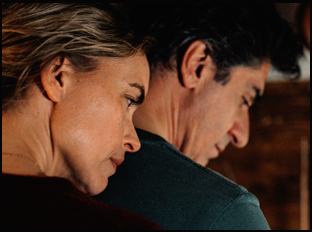
Nina Hoss: Ina learned the violin for 13 years and I did the same with the piano, so practicing an instrument, fighting through it and all of that, I know that. [laughs] But not to this extent because I love playing music, but I always knew I’m not going to be a musician.
Ina Weisse: But the teacher was so happy to work with [Nina]. She said, “She’s so good.” She had never seen someone who started violin and got so good so quickly.
Nina Hoss: Yeah, there’s something so intuitive [with the violin], whereas with the piano, I never got to that stage where I feel the keys. I had to concentrate, but the violin, you can’t really see where the sound is. It’s like a memory in your muscles and bones, so it’s a very emotional relationship and physical, so I loved that about this instrument and it told me so much about [Anna].
Ina Weisse: It’s a little bit like singing. It’s like your voice.
Nina Hoss: Yeah, it’s an extension of your body. You feel it — also this wood [of the violin], that’s why I love that the husband is a violin maker. It’s all very sensual and when you can’t get to the point that you dream of with something you love so much, it’s heartbreaking.
How did you find Serafin Mischiev, the young boy that played Jonas?
Ina Weisse: I researched at the Bach Museum in Berlin and a piano teacher [there] told me, “You have to take a look at this boy.” I saw a lot of boys, about a hundred, and went to every concert, and when I saw [Serafin] and he was a little strange, and I thought that’s interesting. When I did a casting [session] with him, he was talking like we are talking now together. It was very normal. And he is obsessed with the instrument. There is one scene where [Anna] hits him and I wanted him to shut the instrument [in a box]…but it was impossible.
Nina Hoss: He said “No! It’s an instrument!”
Ina Weisse: “I can’t.”
Nina Hoss: And it was a prop. It was not even his. And he refused.
Ina Weisse: And that was very interesting. You can’t see if somebody is a musician. There are some people who are just walking around the school and they have their violins, but [you see] how you treat your instrument. That was very necessary to see it in every moment that people are real musicians – even the extras. Every single last extra was a musician because sometimes [you see in just the movement], it’s like “No.”
Nina Hoss: You don’t do that if you take it seriously.
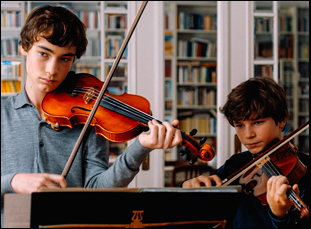
Nina Hoss: Yeah, those were two very different sets of children, so it required different skill sets. [laughs] But in our case, it was very easy because they were so open and so natural. Serafin just works with you and they trusted us very much – [Ina] and me — and they didn’t think they were taken advantage of. They were just having fun basically.
Ina Weisse: It’s a [matter] of atmosphere, which is something you can’t explain very well.
Nina Hoss: And they’re being loved. We loved what they were doing, giving them compliments all the time and not just because that’s what we need to do to get what we want. They were actually fantastic. So it was a very genuine, great working atmosphere.
Ina Weisse: But [Ilja Monti], the student, had to run the stairs up and down [and after a take where it didn’t look right] he’s sometimes he comes in like, “No, what’s the problem?” [I’d say] “No, you have to be like that,” [so you’d tell him] and then he forgot everything…
Nina Hoss: It’s true. [laughs] It was not always a fairy tale. You tend to forget those moments. But it’s interesting because Ilya, who plays the student, is not an actor, and Serafin is, so sometimes he’s like, “Why again? Why do I have to do it again?” That’s the process of filming. [laughs] But he got what his character goes through and he’s really willing to go there. He was amazing playing [the violin], like [he’d play a piece] 60 times and he did it without any complaint.
Ina Weisse: He’s very good. He wins many prizes now in Germany.
Nina Hoss: Yeah, right after the film, he won a great violin — I actually didn’t know that whole system [to] becoming a musician. You go to these competitions so you can land a violin, which costs maybe €15,000 And then you have to show that you are actually making progress and then you can have another [competition] to get a violin for €25,000. It’s this whole business of competitions. It’s crazy. What pressure.
Ina Weisse: You can’t cheat if you’re playing an instrument. And that [builds] something with your character if you are a musician. You see it too with actors, but you play one piece…
Nina Hoss: It’s like a ballet dancer. You’ve got to put the work in.
Coming from an acting background, is there anything you incorporate into your process that you’d want from a director?
Ina Weisse: I don’t compare it. Perhaps I can feel if somebody’s afraid and I see why they use tricks in this moment and I can try to help come to a special point or another way to open [the scene]. I tried to give trust [to Nina] and to give her space, but I don’t know how to direct if I’m not an actor, so I can’t say what difference there is. Perhaps [Nina] can say it…
Nina Hoss: It’s pretty much that. When [Ina] sets up the scene, if she’s not content and even if she can’t find immediately the point where it is, she’s searching until we find it, and there’s just a very concentrated point of view, which I couldn’t really say this comes from her being an actress, but she knows what atmosphere is needed that you can come to this point of concentration and to trust that this is enough. And maybe if [Ina] sees someone is nervous and pulls out their little trick, she finds another way. She doesn’t go, “But this is how it needs to be.” It’s “Okay. Let’s work with this,” and from the back door, she finds another entrance to what she wants.” If she knows the scene is a highly emotional one, [and an actor] needs their space, I always had the feeling she knows exactly where everyone is and she can pick us up from there. So maybe it has to do with this experience [of being an actor].
Ina Weisse: Perhaps, but it’s very interesting to work with Nina [because] there is no end. You try [a scene] again and [she] goes deeper and deeper and deeper. That was, “poof.” [Mind blown.] That was amazing for me to watch in this film.
“The Audition” opens on June 26th in virtual cinemas, with proceeds split with your favorite local arthouse. A full list of theaters is here.



